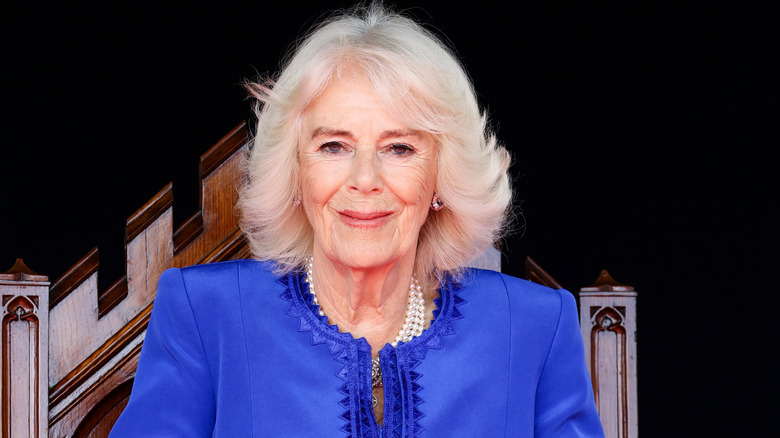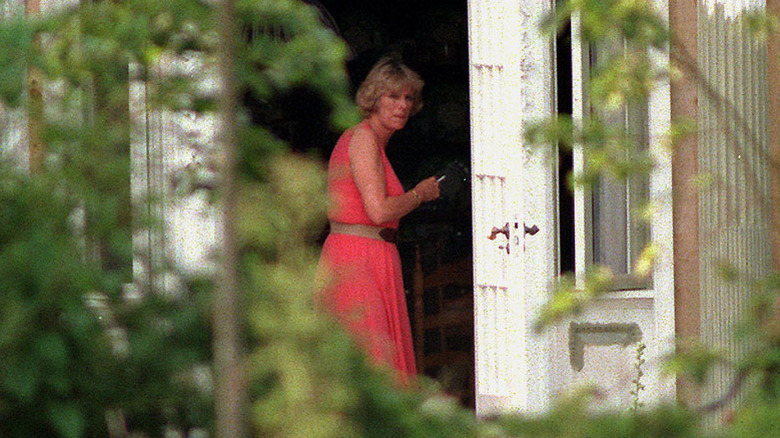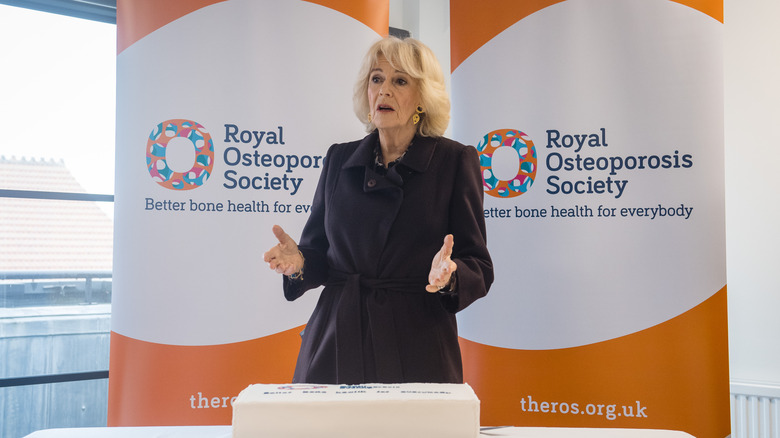Does Queen Camilla Still Smoke? This Is When The Royal Reportedly Kicked The Bad Habit
In the '60s, when Queen Camilla was growing up, about 51% of adult Britons smoked cigarettes. The queen consort, formerly known as Camilla Parker Bowles, joined the crowd a few years later. She maintained the bad habit for 30 years until quitting at the turn of the century. King Charles III, on the other hand, followed in the late Queen Elizabeth II's footsteps and led a smoke-free lifestyle — for the most part. In 2013, he admitted to experimenting with cigarettes early on.
"He said 'I gave up at 11 when I had a few cigarettes behind a chicken coop,'" nurse Paul Watson recalled Charles saying at the Nursing Times awards, The Mirror reported. Charles reportedly spent years trying to persuade Camilla to quit, but she just couldn't give up her half a pack a day. Her habit was so strong that she had rules laid out for her staff. "Footmen are instructed to place silver cigarette boxes containing her favorite brand [of cigarette] in every room," Brian Hoey wrote in "Not in Front of the Corgis" (via Express).
Camilla also asked them to make her life easier by having matches easily accessible. "[They had to] make sure that matchbox holders in solid silver containers are placed upright near at hand with one match half withdrawn so she does not have to scrabble about looking for a light," he added. Whenever she stepped out of any room, her staff emptied all ashtrays. Thankfully, she kicked the habit in 2001 with some spiritual help.
Queen Camilla reportedly quit in 2001, shortly after relationship with Charles was acknowledged
Queen Camilla is said to have quit cigarettes in early 2001, just a few months after she was publicly seen with Queen Elizabeth II for the first time. For many, that shared lunch meant the royal family's official acknowledgment of King Charles III and Camilla's relationship. While her future husband's distaste for cigarettes may have contributed to her motivation, Camilla quit because smoking was aggravating her allergic rhinitis, the Daily Mail reported that year.
She couldn't cope with the lingering symptoms anymore. "She had a persistent cough which she couldn't shake off," one of her friends said. "It wasn't connected to her smoking but she decided it was a good opportunity." Camilla found the strength to stay on the right path thanks to a trip to the Himalayas earlier in the year accompanied by the controversial healer Mosaraf Ali. "She's been trying to give up for as long as I have known her but this time she's given up for good," the friend said.
However, a different source later claimed Camilla didn't completely give cigarettes up back then. "She cut it back to three a day and never touched one before 6 p.m.," an insider told the Daily Mail in 2015. But the source said she quit that year. "Gradually, she found the cravings subsided and was able to go without any." As with anything royal-family-related, it's hard to know exactly when she gave up the habit completely.
Queen Camilla is passionate about health causes
Despite her decades-long cigarette addiction, Queen Camilla has led a largely healthy life. In 2007, she underwent a routine hysterectomy that was unrelated to cancer. "[It] is something that's very common for women of that age," a royal spokesperson told CNN. Other than the surgery, Camilla suffered a broken leg during a hike near the Balmoral estate in 2010. But she was fine. "The Duchess is cheerful and it's a case of 'Life goes on — it could be worse,'" a spokesperson told The Standard.
Instead, her passion for health initiatives comes from her family history. Camilla tragically lost her mother to osteoporosis in 1994. "We just watched her shrinking before our eyes," she said in a 2021 interview with BBC's Gloria Hunniford, according to the Daily Mail. In 2001, Camilla became president of the National Osteoporosis Society, marking the beginning of her public life. The queen consort hasn't shared whether she also suffers from the bone condition, but it runs in her family.
Her grandmother also died from complications of osteoporosis in 1986. Her losses motivated Camilla to help advance efforts to improve the lives of those living with the condition. "My mother, I think, went to see everybody you could possibly think of and they all said the same thing — 'Sorry, you're old,'" she said. She wants to see that change by addressing prevention. "I'd love to see more young people understanding about it, not just thinking, you know, "poor old bats,'" she said.



